 Abengoa
Abengoa
Annual Report 2013
- Activities
- Activities
- Industrial production
Abengoa uses this line of business to group together its technology-heavy businesses, such as biofuels, industrial waste recycling, hydrogen technologies, marine power, energy crops and the development of solar technology. In these businesses, the company enjoys a strong position of leadership in the geographic markets where it operates.
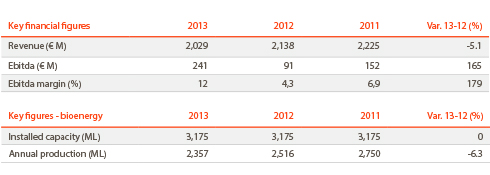
Bioenergy business
Abengoa´s bioenergy business carries out industrial production activities in the energy sector. It produces transport biofuels, bioethanol and chemical bioproducts that use biomass (cereal grains, sugarcane, cellulosic biomass, oleaginous seeds and solid waste) as feedstock. Biofuels, bioethanol and biodiesel, among others, are used in the production of gasoline additives (ETBE) or in direct blends with gasoline or gasoil, and they significantly reduce greenhouse gas (GHG) emissions and the emission of other polluting gases into the environment. The chemical bioproducts are identical to those produced by the petrochemical industry in terms of functionality, and, in turn, they are more sustainable and are appropriate for immediate replacement in current markets.
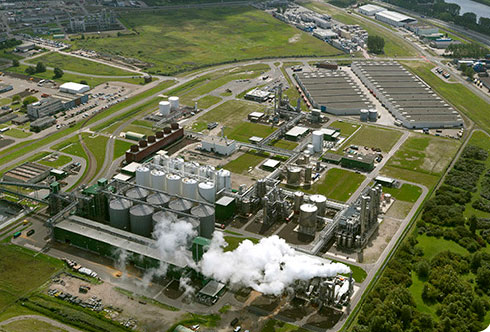
The biofuel market is currently undergoing an important transformation, in which Abengoa finds itself as the leader in biotechnology, broadening its activities and diversifying the production of bioproducts. The company faces the challenge of reducing its exposure to market instability. The success and differentiation of Abengoa Bioenergía’s business is based on proprietary technology and a solid portfolio of products made from natural resources.
In 2013, market behavior was unstable, as reflected in profit margins across-the-board. In the United States and Europe, good results in cereal harvests led to a drop in feedstock costs and thus in production costs, in turn leading to increased sales and revenue. Markets behaved favorably in Brazil, in spite of lower sales prices due to more products on the market, and thanks to changes to the tax system and increased gasoline prices in comparison with bioethanol.
The record sugar harvest worldwide led to a slight price drop, which later stabilized. Co-product animal feed markets have behaved similarly in recent years, showing a tendency to rise during the last months of the year.

In this area, the corporate mission of Abengoa´s bioenergy business is to engage in the following activities with a view to reaping the greatest returns for its stakeholders, industry and society at large:
- Fostering the sustainable development of the transport biofuel market while developing biochemical products through the use of renewable raw materials and environmentally-friendly technologies that help curb GHG emissions and cushion the environmental impact.
- Developing innovative technology solutions through continuous investment in R&D, leading to more efficient production processes, diversification of raw materials and the manufacture of new products.
- Creating value for shareholders by focusing business on the creation of profitable and sustainable technology solutions.
- Promoting the personal and professional development of its employees through continuous training and setting up and overseeing customized development objectives and plans.
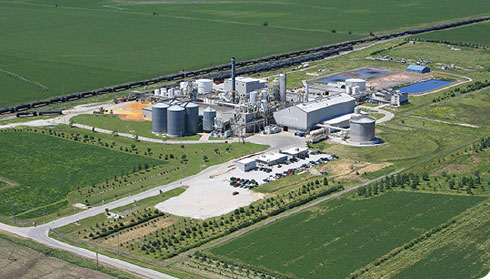
With this approach, it is the aim of Abengoa:
- To cement its position as one of the world’s leading companies in the production and sale of biofuels and chemical bioproducts manufactured from renewable raw materials.
- To be recognized as a global leader in research and development, renowned for its technological innovation in converting biomass into fermentable sugars and then into bioethanol, biodiesel, kerosene-type jet fuel and chemical bioproducts, and in upgrading first-generation assets so as to diversify its product portfolio.
- To provide an unrivalled working environment to attract the finest human talent and maintain its excellent levels of business.
- To attract the interest and gain the respect of the financial community through sustained growth and technological innovation.
Lines of business
Abengoa is Europe’s leading biofuel producer (with a production capacity of 1,500 ML) and one of the main producers in the United States (1,440 ML) and Brazil (235 ML), with a grand total of 3,175 ML of installed production capacity distributed among 14 plants, operating in five different countries, spanning three continents. In addition, the first commercial 2G (second-generation) plant has been completed. Abengoa Bioenergy Biomass of Kansas will have an annual production capacity of 100 ML of bioethanol produced from wheat, corn and herbaceous crops. These plants cater to the demands of global biofuel markets from practically any corner of the globe.
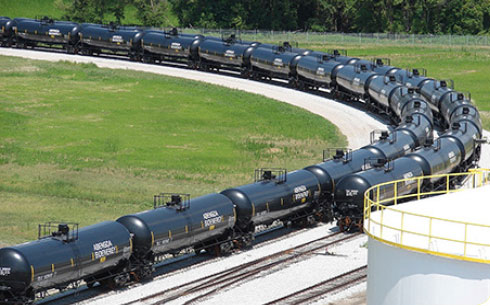
Abengoa develops innovative technology solutions through continuous R&D investment. These solutions are put into practice in production processes, allowing the company to enjoy the same production costs as for conventional fossil fuels and to move into new chemical bioproducts.
With a view to using new raw materials as sources of carbon, the company’s efforts focus on enzymatic hydrolysis and catalysis processes, with a view to diversifying the range of feedstocks from which biofuels and bioproducts can be produced. The main objective being pursued is to produce bioethanol from lignocellulosic inputs, chiefly different kinds of cereal straw and herbaceous crops.
The biotechnology sector uses genetically engineered microorganisms, leading to progress in the production of cellulase enzymes, biologically-based chemical substances and hi-tech fuels.
In addition, Abengoa offers a wide range of services, including technology licensing, project development, biomass supply and logistics, agricultural management of biomass/energy crops, construction management, operations management, product marketing, raw materials coverage and contribution margins.
Projects by territory
In 2013, Abengoa developed its business in the projects of the commercial biomass-to-ethanol biorefinery (2G) in Hugoton (Kansas, USA) and the waste-to-biofuels (W2B) facility, in the pilot phase at the plant in Salamanca for the management of municipal solid waste (MSW). In addition, the company is working on the research and definition of the technology to produce n-biobutanol, which will diversify and add value at the first-generation plants.
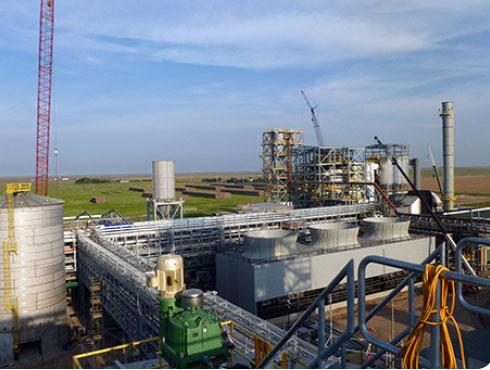
W2B project
The creation of municipal solid waste (MSW) is an inevitable result of human activity and its efficient management is a global need and one of the main challenges faced by modern society. The increasing global population and its consumption habits translate into the ever-increasing creation of waste, year upon year. In addition, the currently available solutions are all based on dumping, which does nothing to eliminate MSW, but merely confines it, or incineration, with its considerable environmental impact.
Moreover, approximately 60 % of MSW is of organic origin, while 15 % is plastic. The organic matter content may be as high as 80 % in Latin America and, added to the negative costs of MSW in comparison to other raw materials such as biomass, MSW therefore seems to be an area of opportunity.
The aim of the waste-to-biofuels (W2B) project is to develop a comprehensive solution for MSW management, permitting, on the one hand, the optimal use of its components through conversion to biofuels and energy and, on the other hand, providing a more sustainable and efficient alternative to the final disposal of waste at landfill sites.
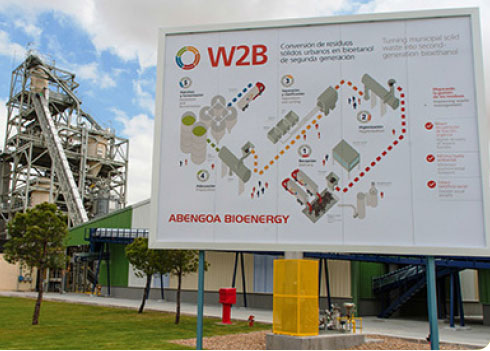
The W2B project is currently in the demonstration phase, for which purpose the biomass biorefinery located in Babilafuente (Salamanca) has been modified to be able to also process MSW and thus validate the complete ethanol from organic waste production chain. The operation of the demonstration plant provides valuable information for the design and subsequent operation of the commercial plant, thereby permitting the industrialization of this technology.
The use of W2B technology is not only limited to the organic part of MSW. The remaining recyclable components (metals, aluminum, plastics) and non-recyclable components are also treated. Using the appropriate technology it is possible to obtain biodiesel, and generate steam and electricity from these components.
It is an innovative process that will revolutionize MSW management. Through the use of MSW technology, it is possible to evaluate the output and production costs derived from the different processes from which second-generation bioethanol is produced.
At the same time, laboratory work serves to gain further knowledge on waste at different sites, following the company’s strategy to provide a global solution at the locations where the company operates.
Catalysis: n-biobutanol
In order to diversify and add value at the first-generation plants, Abengoa focuses its efforts on the research and definition of technology for the production of n-biobutanol, which is a product widely used in the chemical market. The main application of n-butanol is as an acrylate for coatings, lacquers and enamel paints, as acetate and glycerol ester, and as a direct solvent.
N-butanol was first produced by ABE fermentation (~1920) until it was surpassed by the petrochemical route, with this being the most important route from 1950 until now. Several companies have recently shown interest in improving the ABE process to make it competitive. Abengoa´s bioenergy business is committed to using the company’s existing assets for the catalytic production of n-biobutanol from bioethanol, which is a brand-new and more efficient process. This solution therefore permits the construction of an adjacent plant, affording flexibility in obtaining ethanol, butanol or a combination of both.
Petrochemical butanol is generally produced using the oxo process, where propylene reacts with carbon monoxide and hydrogen, forming a mixture of normal and iso-butyraldehyde, whose ratios depend on the catalyst and operating conditions. Both these isomers are then separated and hydrogenated to form normal and iso-butanol, as the main products.
The ABE process uses simple sugars as the raw material, used for fermentation in two stages, using a bacteria, which has significant disadvantages in comparison to other methods.
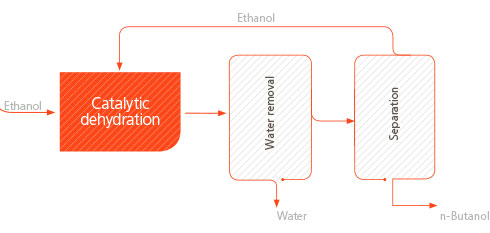
The solution proposed by Abengoa for the production of n-biobutanol by catalysis affords significant advantages. The main element is the reactor where the bioethanol passes through the catalytic bed, forming n-biobutanol and other co-products. A separation process is used to separate the n-biobutanol from the other co-products, upon which it is purified to meet commercial specifications.
Having synthesized and patented the catalyst with a high degree of selectivity and conversion, the bench and pilot-scale technology has been successfully scaled, while managing to demonstrate the catalyst’s stability.
Applying the knowledge gained in previous developments, a work methodology has been defined for analysis and quantification of the reaction products, leading to reliable results throughout all the different tests it has undergone. The obtained results afford the necessary knowledge to tackle the next phases of the project and to achieve the goal of industrial butanol production by 2015.
The production of biobutanol will create a renewable alternative to butanol produced from fossil fuels, reducing the CO2 footprint to end users while opening the door for Abengoa´s bioenergy business to the bioproducts market, mostly comprising chemical products of high added value.
Hydrogen
The European Parliament recently approved the proposal for a directive on the use of alternative fuels. This proposal includes the use of hydrogen as fuel for highway transport, and it calls on the EU member states to define strategies and set up hydrogen fueling stations. Abengoa´s hydrogen area, whose purpose is the sustainable production of hydrogen and its use as a fuel, is ready to face the challenge, with new renewable hydrogen production systems and the use of fuel cells and hydrogen engines to convert this fuel into electric, thermal and mechanical energy.
The aim of Abengoa is to develop sustainable hydrogen production plants and systems, using different technologies (electrolysis, reforming, cracking, etc.), and to store this gas and use it as a fuel in high and low- temperature fuel cells), engines and turbines. The final application will vary in terms of customer needs, from stationary systems (cogeneration plants) to the naval and aerospace sectors. For such purpose it is developing technology in the areas in which it operates, through continuous investment in innovation, giving the company its own know-how portfolio with which it can offer custom-made solutions.
Abengoa´s hydrogen area operates out of its headquarters in Seville and carries out projects in different countries. Its strategy is based on growth of sustained and continuous investment in innovation (close to €15 M in 2013), enabling it to develop a technological product portfolio to meet the demand of its customers.
In 2013, Abengoa completed the engineering of the last of the three systems developed for the S-80 submarine air-independent propulsion (AIP) system, being built by Navantia for the Spanish Navy. Construction of the bioethanol processing system (BPS) to supply hydrogen to the submarine’s AIP is scheduled for completion next year. This BPS system will be connected to other already developed systems: the power adjustment system (PAS) and the AIP control system (AIPCS).
Work has also been completed on the engineering of the molten carbonate fuel cell cogeneration plant to be installed at Abengoa’s facilities in Torrecuellar (Seville). The construction of this plant will be completed in 2014. It will have a high-temperature fuel cell, using this technology and will supply 300 kW of electric energy and the same amount of thermal energy at the aforementioned facilities.
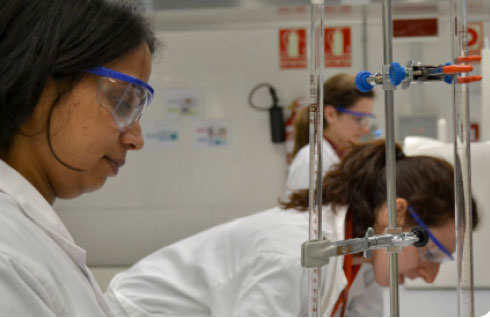
Energy Crops business
Abengoa uses this line of business to group together its technology-heavy businesses, such as biofuels, industrial waste recycling, hydrogen technologies, marine power, energy crops and the development of solar technology. In these businesses, the company enjoys a strong position of leadership in the geographic markets where it operates.
In terms of consequential changes, on an international level, to the energy matrices of countries dependant on fuel imports, mainly in Europe, and with the growing need for energy produced from renewable sources, the production of biomass is fast becoming an efficient alternative due to its cost-benefit ratio. Sources in the sector affirm that, by 2020, Europe will triple biomass imports from the Americas and Africa.
Abengoa’s energy crops area is involved in the development, promotion and operation of sustainable projects in forestry services, production, transformation and marketing of forest biomass, creating value for the company’s, employees, customers and other stakeholders, based on experience gained, research and innovation, and continuous improvement of its management system. The company’s vertical integration business model covers the entire production chain, from biotechnology right up to the sale of the end product, and it enjoys the support and experience of Abengoa in engineering and construction, operation and maintenance, and forest logistics, enabling it to offer a reliable and sustainable service to the international market.
In 2013, the company completed the first pilot plantation project for energy purposes and two research projects in Uruguay with results that can be extrapolated in other regions around the world. The company is developing projects for the production of wood pellets in southern Brazil and the southeast of the United States, and operations are expected to be replicated in other countries, which, given their geographic, climatic, water and infrastructure characteristics, have favorable conditions for this type of plantations.
Since 2011, Abengoa has invested over $8 M in the development of energy crops, mainly in R&D and equipment, to provide forestry services in Uruguay. Abengoa aspires to become the world’s leading company in terms of biomass procurement, handling and marketing for energy purposes, through innovative biotechnological, industrial and logistics solutions, contributing toward sustainable development.
Abengoa carries out three activities in the area of energy crops:
- 1) Research and development.
- Biotechnology applied to energy crop plantations.
- Innovations in industry and logistics for energy crop plantations.
Abengoa offers custom-made and sustainable biotechnological solutions, which maximize the amount of harvested energy crops per hectare and facilitate productive and commercial integration. The company’s program focuses on the selection, propagation, planting, production handling and harvesting of dendroenergy crops, geared toward the development of innovative technologies that support the planning and specialized management of forest plantations as a cost-effective and sustainable source of biofuels.
- 2) Production and marketing of biomass for energy, worldwide.
- Planting of energy crops with species selected by the R&D area.
- Development of pellet production projects, using existing biomass and energy crop plantations at different locations.
Abengoa has detected and developed business options related to the supply of biomass for energy purposes, including access to land, engineering, production and marketing of biomass in different forms. Wood pellet power generation projects are underway, using biomass, marketed at energy crop plantations, with projected uses for the production of solid biofuels, bioethanol and other energy bioproducts.
- 3) Forestry services and marketing of biomass in Uruguay: Since 1996, the company has provided services to the Uruguayan forestry sector and it sells biomass as an industrial energy source. The services include the harvesting, extraction and loading of wood with its own equipment, and in accordance with the parameters of an integrated management system (quality, environment, safety), certified since 2001. Forestry activities began in the same year on a national level.
In the area of R&D, in the coming years, the company will impulse the use of biotechnological tools applied in the selection and scaling up of tests, at locations such as Brazil and the US, to demonstrate the productive merits of the species selected for biomass used for combustion. Plans are also underway for the evaluation of the agricultural merit of candidate species for the production of second-generation bioethanol production.
In the industrial area of biomass production and transformation, the goal for 2014 is to structure the projects, including aspects ranging from financing to the signing of offtake agreements for the sale of wood pellets in Brazil and the US.
Abengoa’s main energy crop projects in 2013 were as follows:
- In Uruguay, the drive continues with the biotechnology R&D project, focused on energy crop plantations, where the company is working on agreements with academic institutions with the support of the National Research and Innovation Agency of Uruguay (Agencia Nacional de Investigación e Innovación de Uruguay, or ANII) and the National Institute for Agricultural Research (Instituto Nacional de Investigación Agropecuaria, or INIA). Plans are underway, in the short-term, to carry out demonstration testing.
- Since 2012, Abengoa has successfully provided services for the receipt, storage and supply of wood for one of the main cellulose companies in Uruguay, namely “Montes del Plata.” In 2013, operations began at wood storage yards with an annual capacity of 4 MT, and harvesting and forestry agreements were renewed for a term of five years.
- Other projects in Uruguay, in the area of biotechnology applied to energy crop plantations, include:
- The development of biotechnologies applied to clonal propagation and genetic selection of forest species.
- Testing for the evaluation of forest species and clones, in three experimental areas.
- The pilot-scale planting (50 ha) of different forest species, representing real conditions of the short rotation energy crop plantation model.
- On an international level, conceptual engineering has been developed, and estimates have been made for the works for the first pellet plants in the US and Brazil, in line with the company’s progress in finalizing negotiations for three industrial pellet production projects and offtake agreements. Negotiations and financing will be finalized in 2014.
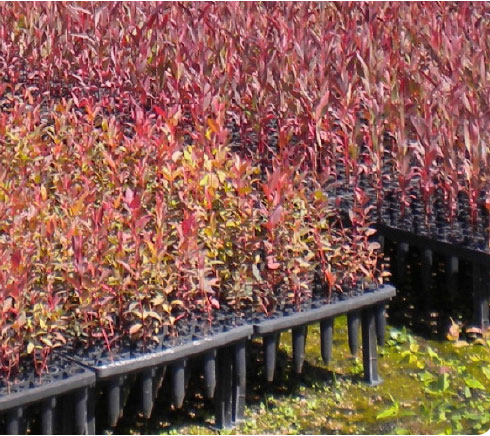
Bioethanol plant in Rotterdam, Europoort, Netherlands.
Rally car running on E85 supplied by Abengoa.
Bioethanol plant in York, USA.
Bioethanol rail cars at the Abengoa´s bioenergy business of Nebraska plant in the US.
The Abengoa´s bioenergy business Biomass of Kansas 2G biomass-to-ethanol biorefinery, in Hugoton KS, USA.
W2B technology demonstration plant at Biocarburantes de Castilla y León, Spain.
Abengoa´s bioenergy business biobutanol production process.
© 2013 Abengoa. All rights reserved